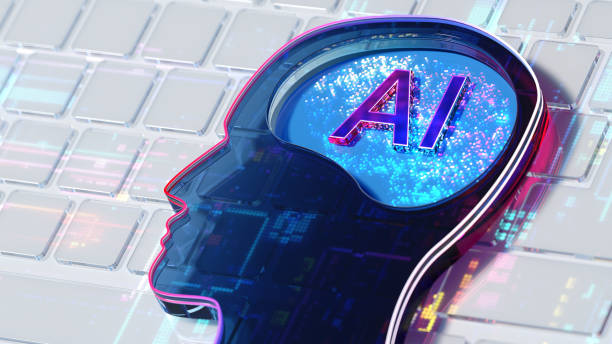### What is an Artificial Intelligence Robot and What are its Applications?
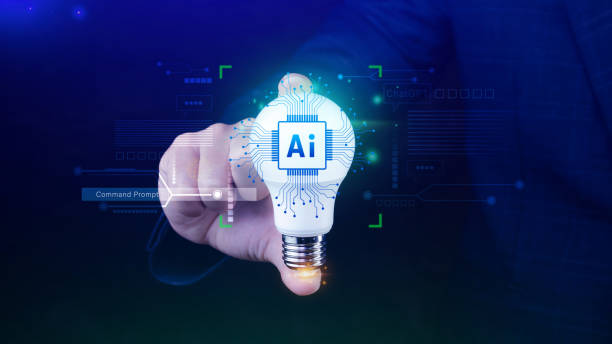
#Artificial Intelligence Robot is a combination of two important areas of technology: #Artificial Intelligence (AI) and #Robotics.
In simple terms, these robots are machines that, using artificial intelligence algorithms, are capable of performing tasks that typically require human intelligence.
These tasks can include learning, reasoning, problem-solving, understanding natural language, and even creativity.
The applications of artificial intelligence robots are very broad and can be found in almost every industry.
These applications include:
- Industry: Industrial robots equipped with artificial intelligence for process automation, quality control, and increased productivity.
Industrial robots - Medicine: Surgical robots, rehabilitation robots, AI-based disease diagnosis systems, and robots providing care services.
- Customer Service: AI-powered chatbots and virtual assistants to answer customer questions, provide support, and guidance.
- Education: Intelligent educational systems that can personalize educational content based on the needs of each student.
- Agriculture: Agricultural robots for planting, harvesting, spraying, and irrigating crops.
- Transportation: Self-driving cars, drones, and intelligent traffic management systems.
The benefits of using artificial intelligence robots include increased accuracy, reduced errors, increased speed, reduced costs, and the ability to perform dangerous or repetitive tasks.
However, there are also challenges, including the high cost of development and deployment, ethical concerns related to employment and privacy, and the need for expertise to manage and maintain these robots.
Artificial intelligence robots, as a powerful tool, have great potential to improve human life and create transformation in various industries.
Are you bothered by losing customers who visit your site to buy?
Rasaweb is your specialized solution for having a successful online store.
✅ Significant increase in your online sales
✅ Creating trust and professional branding with customers⚡ Get free consultation from Rasaweb experts!
Main Components of an Artificial Intelligence Robot and How it Works
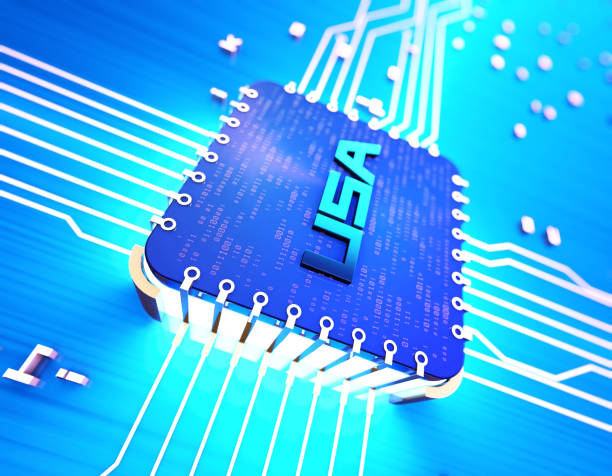
An artificial intelligence robot consists of several main components that, working together, enable the performance of intelligent tasks.
These components include:
- Sensors: Sensors are responsible for collecting information from the surrounding environment.
This information can include visual data (camera), audio (microphone), thermal, tactile, and other types of data. - Processor: The processor (usually a computer) is responsible for processing the data collected by the sensors and running artificial intelligence algorithms.
- Artificial Intelligence Algorithms: These algorithms are the beating heart of the artificial intelligence robot and are responsible for decision-making, learning, and performing intelligent tasks.
There are different types of artificial intelligence algorithms, including machine learning, deep learning, natural language processing, and expert systems. - Actuators: Actuators are responsible for performing physical actions.
These actions can include movement, grasping objects, speaking, and other types of physical activities. - Power Source: The power source (usually a battery) provides the energy needed for the robot to function.
The way an artificial intelligence robot works is that the sensors first collect information from the environment.
Then, this information is processed by the processor and transferred to the artificial intelligence algorithms.
Based on the received information and their prior knowledge, the artificial intelligence algorithms make decisions and issue instructions to the actuators.
The actuators then execute these instructions and perform the necessary physical actions.
This process is repeated continuously, and the artificial intelligence robot is constantly learning and improving its performance.
Using this process, the artificial intelligence robot can perform complex tasks that typically require human intelligence.
Robotics Training
Introduction to Types of Artificial Intelligence Algorithms Used in Robots
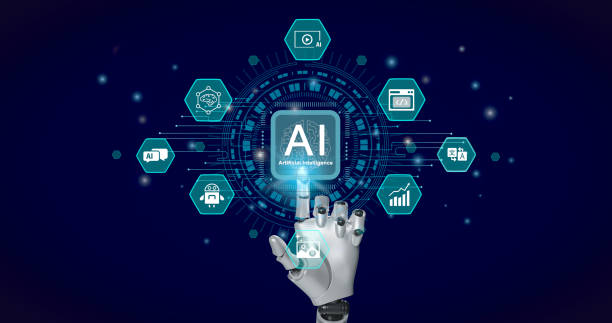
Artificial intelligence algorithms play a fundamental role in the operation of robots and enable them to perform complex tasks.
Below, we introduce some of the most common types of artificial intelligence algorithms used in robots:
- Machine Learning: These algorithms allow robots to learn from data and improve their performance without explicit programming.
There are different types of machine learning algorithms, including supervised learning, unsupervised learning, and reinforcement learning.
Artificial intelligence robots use machine learning for object recognition, navigation, and decision-making. - Deep Learning: These algorithms are a subset of machine learning that uses deep neural networks to model data.
Deep learning is very effective for tasks such as image recognition, natural language processing, and speech recognition.
Artificial intelligence robots use deep learning to understand their surroundings and interact with humans. - Natural Language Processing: These algorithms enable robots to understand and produce human language.
Artificial intelligence robots use natural language processing to answer questions, provide instructions, and interact with users. - Expert Systems: These systems use the knowledge of human experts to solve complex problems.
Artificial intelligence robots use expert systems to diagnose diseases, troubleshoot machinery, and provide specialized advice. - Planning and Reasoning: These algorithms enable robots to set their goals and create plans to achieve them.
Artificial intelligence robots use planning and reasoning for navigation, performing complex tasks, and solving problems.
Choosing the right algorithm for an artificial intelligence robot depends on various factors, including the type of task the robot has to perform, the amount of available data, and the available computational resources.
Artificial Intelligence Algorithms
| Algorithm | Application |
|---|---|
| Machine Learning | Object recognition, Navigation |
| Deep Learning | Image recognition, Language processing |
| Natural Language Processing | Answering questions |
Ethical and Social Challenges Related to Artificial Intelligence Robots
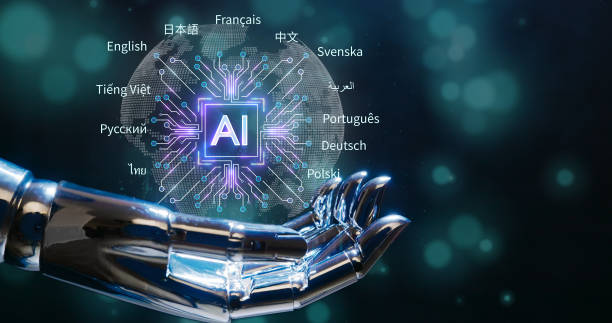
The development and use of artificial intelligence robots, in addition to its many benefits, also poses important ethical and social challenges.
Some of these challenges include:
- Employment: Automation of many jobs by robots can lead to job losses and increased unemployment rates.
This requires appropriate policies for training and preparing the workforce for new jobs. - Privacy: Robots can collect a lot of information about us, including personal information, habits, and behaviors.
This information can be misused and violate people’s privacy. - Accountability: If an artificial intelligence robot causes harm, determining responsibility is difficult.
Is the robot manufacturer, the programmer, the user, or the robot itself responsible? - Discrimination: Artificial intelligence algorithms may be trained based on biased data and, as a result, make discriminatory decisions.
- Security: Artificial intelligence robots can be hacked and used for malicious purposes.
To address these challenges, it is necessary to create appropriate ethical and legal frameworks for the development and use of artificial intelligence robots.
These frameworks should include elements such as transparency, accountability, privacy, and security.
Also, it is necessary to increase public awareness of these challenges and have a broad dialogue about the future of artificial intelligence robots in society.
Artificial intelligence robots should not become a threat, but should be used as a tool to improve human life and solve societal problems.
Ethics in Artificial Intelligence
Do you know that your company’s website is the first point of contact for 75% of potential customers?
Your website is the face of your brand. With Rasaweb’s corporate website design services, build an online presence that earns customer trust.
✅ Creating a professional and lasting image of your brand
✅ Attracting target customers and increasing online credibility
⚡ Get free consultation from Rasaweb experts!
What Will the Future of Artificial Intelligence Robots Look Like?
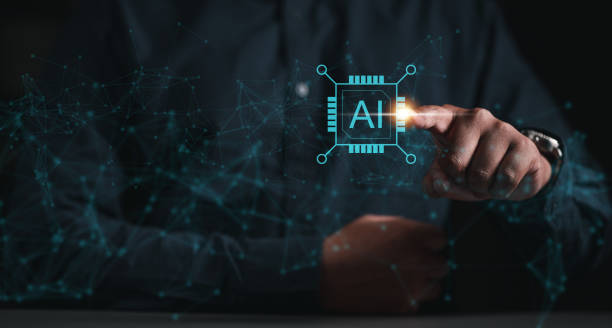
Precisely predicting the future of artificial intelligence robots is difficult, but by examining current trends and technological advances, we can get a general picture of what awaits us.
In the future, artificial intelligence robots are expected to:
- Become smarter and more independent: With the advancement of artificial intelligence algorithms, robots will be able to perform more complex tasks without the need for human intervention.
- Become ubiquitous: Robots will be present in all aspects of our lives, from homes and workplaces to hospitals and schools.
- Collaborate with humans: Robots will act as human collaborators in the workplace and help perform difficult and repetitive tasks.
- Be personalized: Robots will be personalized based on the needs and preferences of each individual.
- Become more accessible: With reduced production costs and increased efficiency, robots will be more accessible to the general public.
However, it is necessary to pay attention to the ethical and social challenges related to artificial intelligence robots and plan to address them.
The future of artificial intelligence robots depends on the decisions we make today.
With a responsible and informed approach, we can use the potential of this technology to improve human life and create a better world.
Artificial intelligence robots can be a powerful tool for solving global problems, but it requires proper and ethical management.
Future of Artificial Intelligence
The Role of Artificial Intelligence Robots in Industry
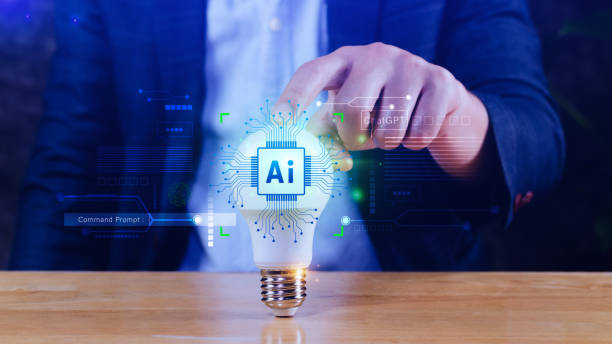
Artificial intelligence robots are creating huge transformations in industry and play a very important role in increasing productivity, reducing costs, and improving product quality.
These robots are used in various industries including automotive, electronics, food and medicine, and logistics.
Some of the key applications of artificial intelligence robots in industry include:
- Process Automation: Robots can perform repetitive and tedious tasks automatically, which leads to increased speed and accuracy of production.
- Quality Control: Robots equipped with machine vision systems can accurately inspect products and identify defects.
- Supply Chain Management: Robots can collect and analyze data related to the supply chain and make optimal decisions to reduce costs and improve efficiency.
- Predictive Maintenance: Robots can collect and analyze data related to the performance of machinery and predict when maintenance is needed.
- Safety: Robots can work in dangerous environments instead of humans and prevent them from being injured.
With the advancement of technology, artificial intelligence robots are expected to play a more prominent role in industry and completely transform production processes.
Artificial intelligence robots as a powerful tool can help companies to be more successful in global competition.
Industrial Robotics
Artificial Intelligence Robots in the Field of Medicine
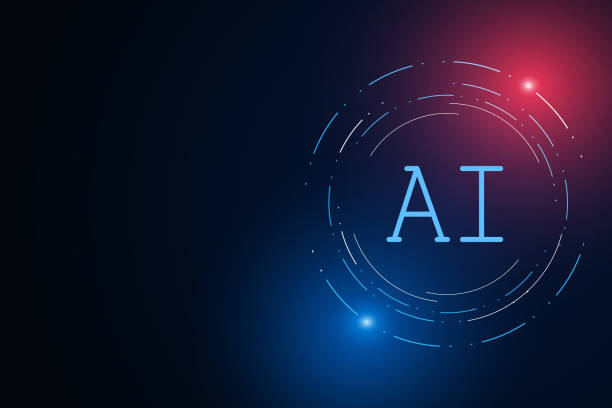
The field of medicine is one of the areas where artificial intelligence robots have great potential to create transformation.
These robots can help in diagnosing diseases, surgery, caring for patients, and developing new drugs.
Some of the important applications of artificial intelligence robots in the field of medicine include:
- Diagnosing Diseases: Artificial intelligence systems can analyze medical images such as MRI and CT scans and diagnose diseases with high accuracy.
- Surgery: Surgical robots can perform complex surgeries with more accuracy and precision than human surgeons.
- Patient Care: Robots can help patients with daily activities, remind them of their medications, and monitor their vital signs.
- Drug Development: Artificial intelligence systems can analyze data related to drugs and identify new and more effective drugs.
- Rehabilitation: Rehabilitation robots can help patients recover their motor skills after injury or illness.
With the advancement of technology, artificial intelligence robots are expected to play a more important role in providing health services and helping to improve the health and well-being of society.
Artificial intelligence robots as a powerful tool can help doctors and nurses to provide better services to patients.
Artificial Intelligence in Medicine
| Application | Description |
|---|---|
| Diagnosing Disease | Analyzing medical images to diagnose diseases |
| Robotic Surgery | Performing complex surgeries with high precision |
| Patient Care | Helping patients with daily activities |
The Impact of Artificial Intelligence Robots on Everyday Life
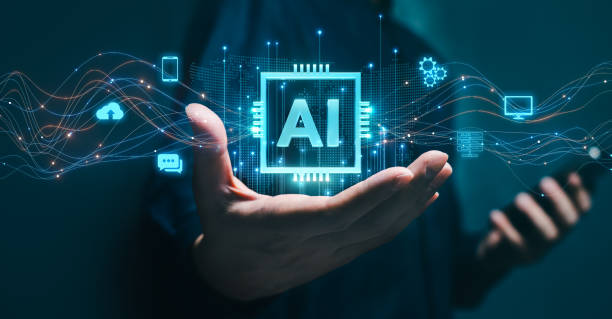
Artificial intelligence robots are gradually penetrating our everyday lives and have significant impacts on how we interact with our surroundings and perform daily tasks.
Some of these impacts include:
- Virtual Assistants: Virtual assistants like Siri, Alexa, and Google Assistant help us do things like set reminders, play music, send messages, and answer questions using our voice.
- Self-Driving Cars: Self-driving cars can make transportation safer and more efficient and allow people to do other things while traveling.
- Smart Homes: Smart homes equipped with artificial intelligence systems can automatically adjust the lighting, temperature, security, and other aspects of the home.
- Home Robots: Home robots can do tasks like vacuuming, cleaning, and caring for pets.
- Personalized Education: Intelligent educational systems can personalize educational content based on the needs and learning style of each individual.
With the advancement of technology, artificial intelligence robots are expected to play a more prominent role in our everyday lives and help us to have an easier, more efficient, and enjoyable life.
Smart Home
Did you know that customers’ first impression of your company is your website? Strengthen your business credibility with a powerful corporate website from Rasaweb!
✅ Custom and eye-catching design tailored to your brand
✅ Improving user experience and increasing customer attraction
⚡ Get free consultation!
New Job Opportunities Resulting from the Development of Artificial Intelligence Robots
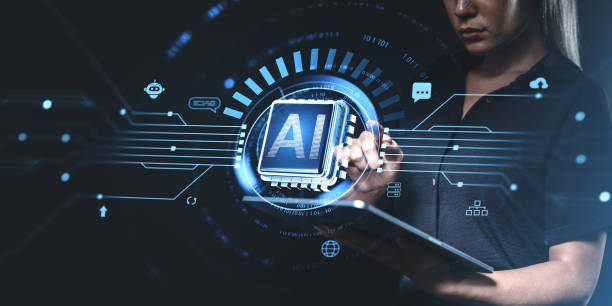
While the automation of many jobs by robots can lead to job losses, the development of artificial intelligence robots also creates new job opportunities.
These opportunities exist in various fields including the design, development, production, maintenance, and training of robots.
Some of the new jobs that result from the development of artificial intelligence robots include:
- Robotics Engineers: These engineers are responsible for designing, developing, and building robots.
- Data Scientists: These scientists are responsible for collecting, analyzing, and interpreting data related to the performance of robots.
- Artificial Intelligence Specialists: These specialists are responsible for developing the artificial intelligence algorithms used in robots.
- Robotics Technicians: These technicians are responsible for maintaining and repairing robots.
- Robotics Trainers: These trainers are responsible for training people to work with robots.
To take advantage of these new job opportunities, it is necessary for individuals to acquire the necessary skills.
These skills include technical knowledge in the field of robotics, artificial intelligence, programming, and data mining, as well as soft skills such as problem-solving, critical thinking, and communication.
Artificial intelligence robots require skilled professionals for development and maintenance.
Artificial Intelligence Jobs
How Can We Use Artificial Intelligence Robots Responsibly?

In order to use artificial intelligence robots responsibly, it is necessary to pay attention to the ethical and social issues related to this technology and take steps to reduce the risks and increase its benefits.
Some of the steps we can take include:
- Developing Ethical and Legal Frameworks: It is necessary to create appropriate ethical and legal frameworks for the development and use of artificial intelligence robots.
These frameworks should include elements such as transparency, accountability, privacy, and security. - Education and Awareness: It is necessary to increase public awareness about artificial intelligence robots and related issues.
- Collaboration and Information Exchange: It is necessary to have cooperation and information exchange between researchers, policymakers, industrialists, and civil society.
- Focus on Human Interests: The development and use of artificial intelligence robots should be done with a focus on human interests and improving the quality of life.
- Preventing Misuse: Misuse of artificial intelligence robots for malicious purposes should be prevented.
With a responsible and informed approach, we can use artificial intelligence robots as a powerful tool for solving global problems and improving human life.
Artificial intelligence robots should be for the benefit of society and not against it.
Accountability in Artificial Intelligence
Frequently Asked Questions
| Row | Question | Answer |
|---|---|---|
| 1 | What is an artificial intelligence robot? | An artificial intelligence robot is a machine capable of understanding, reasoning, learning, and problem-solving, and can perform complex tasks with relative autonomy. |
| 2 | What are the most important applications of artificial intelligence robots? | The main applications include industrial production, customer service (chatbots), medicine and surgery, self-driving transportation, space exploration, and military affairs. |
| 3 | What is the main difference between an artificial intelligence robot and a regular robot? | A regular robot only follows programmed instructions, while an artificial intelligence robot can learn from data, make decisions, and adapt to new environments. |
| 4 | How do artificial intelligence robots learn? | They learn through machine learning algorithms (such as deep learning, reinforcement learning) and processing vast amounts of data, identifying patterns, and improving their performance. |
| 5 | Can artificial intelligence robots have emotions? | Currently, artificial intelligence robots do not have real emotions in the human sense. They can mimic or recognize emotions, but they do not understand or experience them. |
| 6 | What are the current limitations of artificial intelligence robots? | Limitations include the need for a lot of data, the inability to understand abstract concepts, the lack of real creativity, ethical issues, and the challenges of generalizability in new environments. |
| 7 | What is the role of artificial intelligence in the development of humanoid robots? | Artificial intelligence helps humanoid robots to walk, maintain their balance, understand their surroundings, interact with humans, and perform complex tasks. |
| 8 | How is the future of artificial intelligence robots predicted? | It is predicted that artificial intelligence robots will be smarter, more autonomous, and capable of performing more complex tasks in everyday life and industry, and their interaction with humans will increase. |
| 9 | Can artificial intelligence robots replace all human jobs? | It is unlikely that all human jobs will be replaced. Robots will take over many repetitive and dangerous tasks, but jobs that require creativity, empathy, and ethical judgment will remain. |
| 10 | What ethical and social challenges arise with the expansion of artificial intelligence robots? | Challenges include issues related to privacy, data security, ethical decision-making by robots, the impact on employment, and accountability in case of errors. |
And other services of Rasa Web advertising agency in the field of advertising
Smart Social Media: A professional solution to increase sales with a focus on intelligent data analysis.
Smart Google Ads: A novel service to improve SEO ranking through precise audience targeting.
Smart Brand Identity: A creative platform to improve the click-through rate by designing an attractive user interface.
Smart SEO: Transform the improvement of SEO ranking with the help of dedicated programming.
Smart Customer Journey Map: A combination of creativity and technology for managing campaigns by dedicated programming.
And more than hundreds of other services in the field of internet advertising, advertising consulting, and organizational solutions
Internet Advertising | Advertising Strategy | Advertorial Report
Resources
Smart Robot and Smart Systems
,Opportunities of Chat GPT for Journalism
,Artificial Intelligence in Education
,Artificial Intelligence Challenges
? To promote your business in the digital world and reach the peaks of success, contact “Rasaweb Afarin” today and benefit from our professional services in the field of multilingual website design, SEO and digital marketing.
📍 Tehran, Mirdamad Street, next to the Central Bank, South Kazeroon Alley, Ramin Alley No. 6

